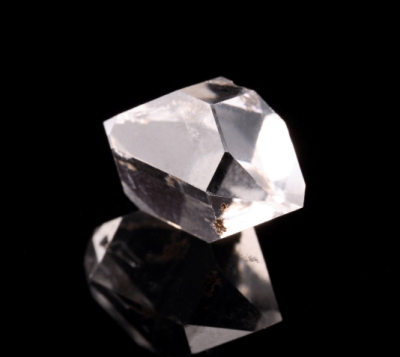Scientists from the Max Planck Institute of Quantum Optics, Harvard University, and Caltech have succeeded in increasing the lifetime of a quantum bit (qubit) in a diamond crystal to over a second at room temperature. In earlier attempts, the storage time of this kind of qubit was only a few thousandths of a second.
 The stuff that quantum memories are made of: an international team of physicists has succeeded, for the first time, in storing a quantum bit in a diamond for longer than one second at room temperature. The researchers did not use a natural diamond like the one shown here, however, neither was it cut. They produced their diamond artificially by depositing carbon containing one hundredth of a percent of the heavy carbon isotope C-13 and a small quantity of nitrogen from the gas phase onto a substrate. The diamond they obtained in this way had an edge length of a few millimetres. (© iStockphoto)
The stuff that quantum memories are made of: an international team of physicists has succeeded, for the first time, in storing a quantum bit in a diamond for longer than one second at room temperature. The researchers did not use a natural diamond like the one shown here, however, neither was it cut. They produced their diamond artificially by depositing carbon containing one hundredth of a percent of the heavy carbon isotope C-13 and a small quantity of nitrogen from the gas phase onto a substrate. The diamond they obtained in this way had an edge length of a few millimetres. (© iStockphoto)
The international research team believes that if this method is improved further, the storage time can even be extended to one-and-a-half days or 36 h. Qubit is the smallest unit of information used by quantum memory. Unlike the bit, the smallest unit of information in a classical computer memory can take either ‘0’ or ‘1’, while a single qubit can store multiple values between ‘0’ and ‘1,’ including them.
For this work, the researchers used a green laser, an ultrasensitive detector that can detect single light particles, and quick-switching sources for radio frequencies and microwaves. They utilized a C-13 carbon isotope’s nucleus, which has a nuclear spin that creates a magnetic moment, for the qubit. Thus, the C-13 nucleus acts as a small bar magnet that is capable of self-assembling in parallel or anti-parallel with respect to an external magnetic field. These two states represent the ‘0’ and ‘1’ of the qubit.
The research team developed the artificial diamond with traces of nitrogen and the C-13 isotope, wherein some nitrogen atoms are situated close to a C-13 atom. In addition, one carbon atom is absent in the direct vicinity of the nitrogen atom, which is called as a nitrogen-vacancy centre or N-V centre. This N-V centre can create a qubit as it has a spin. Using laser and microwave pulses, this qubit can be maintained in a definite quantum mechanical state. In addition, it is easy to read out the data carried by this qubit with a laser beam.
Nevertheless, the coupling to the N-V centre concurrently results in the loss of data by the qubit in the C-13 atomic nucleus within a few thousandths of a second. To overcome this issue, the researchers used a green laser beam to reduce the effect of the N-V centre, which in turn forces the centre to take one of the two magnetic states and avoids the natural magnetic moment fluctuation. Meanwhile, an electron is temporarily knocked out by the laser from the N-V centre, which detains the electron after some time, causing the centre to become ionised and deionised repeatedly. This in turn causes the magnetic moment to jump to and fro.
The researchers then increased the power of the laser to 10 mW in order to allow the magnetic moment to alter its orientation more quickly than in the initial fluctuation. Thus, the qubit in the C-13 atomic nucleus does not experience a constant magnetic field. In this way, the researchers were able to increase the lifetime of the qubit to roughly half a second.
Since the C-13 carbon isotope content in the artificial diamond is mere 1/100th of a percent, the distance between two C-13 nuclei is more than in a natural diamond, thus reducing their interferences. With the help of carefully selected radio frequency pulses, the researchers further neutralized the effects of the C-13 nuclei on the qubit. In these ways, they increased the qubit’s lifetime to approximately 1.4 s.